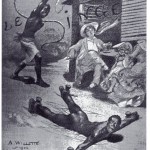I’ve managed to locate another translated scrap of the writings of Leopold von Sacher-Masoch. The Blast Books edition of Venus in Furs, translated from the German by Uwe Moeller and Laura Lindgren, includes a set of letters between Sacher-Masoch and a young Viennese wannabe writer named Emilie Mataja. Their correspondence lasted from late 1874 and 1875, when Sacher-Masoch was still married to Aurora Rumelin. A side issue is their various attempts to send letters anonymously to each other, without being intercepted by his wife and her father.
Mataja idolized Sacher-Masoch to a degree that would be embarrassing for a 13-year-old girl, let alone a 19-year-old young woman. “I worship you as a god, I idolize you through your works. Many a time I’ve revived my tired soul with your fiery words; I’ve shaken my feeble senses from their sleep with the feverish potion that streams from your work.”
He played the, “you are a special, talented person, far above the common horde,” card with her, and did give her advice on her writing career, both as a writer and on the publishing industry. (Whether this wagood advice is another matter.) However, this is when Sacher-Masoch started to sound a little crazy, or at least obsessive. His letters inevitably turned to persuading her to wear furs, going into great details on how to get an ermine jacket, and getting her to whip and dominate him. He sketches out plans for both of them to move to Italy and have an open marriage. He even referred to his wife as “Wanda von Dunajew” in one letter. He has sudden shifts of mood and mixed messages. On July 28, 1875, he called her, “My Charming Mistress!” By October 31, 1875, it was back to “Dear Miss Mataja”. By December 22, 1875, he went into great detail about how his own wife is now his ideal cruel woman, as if to say that he was the victor in their abortive affair and he didn’t need her anymore.
Mataja, much like Aurora Rumelin, was really after literary validation and connections from Sacher-Masoch, and was evasive about actually doing anything kinky with him.
Had they lived closer together, or Sacher-Masoch been a better seducer, this might have ended in tragedy, but instead it ended in comedy. They met for the first time a few years later in Vienna. He begged her to whip him, and in furs, of course. She said she would, so long as it was just the one time. Naturally, this wasn’t satisfactory for him. “I let the matter drop because I was beginning to tire of the joke (for me it was only a joke.” Then he inquired if she was still a virgin and passive-aggressively suggested that she was a lesbian.
“My impression was that he was highly peculiar, but I must say that apart from his sexual eccentricities, he was an affable, simple, and likeable man; and that there was something particularly moving about his tender adoration of his children.”
I don’t know why, but I have an urge to to salvage Sacher-Masoch’s personal and literary reputation, which grows in proportion to the evidence that he was something of a jackass. Then again, literary history is full of people who were acknowledged as geniuses but had sketchy personal lives.



